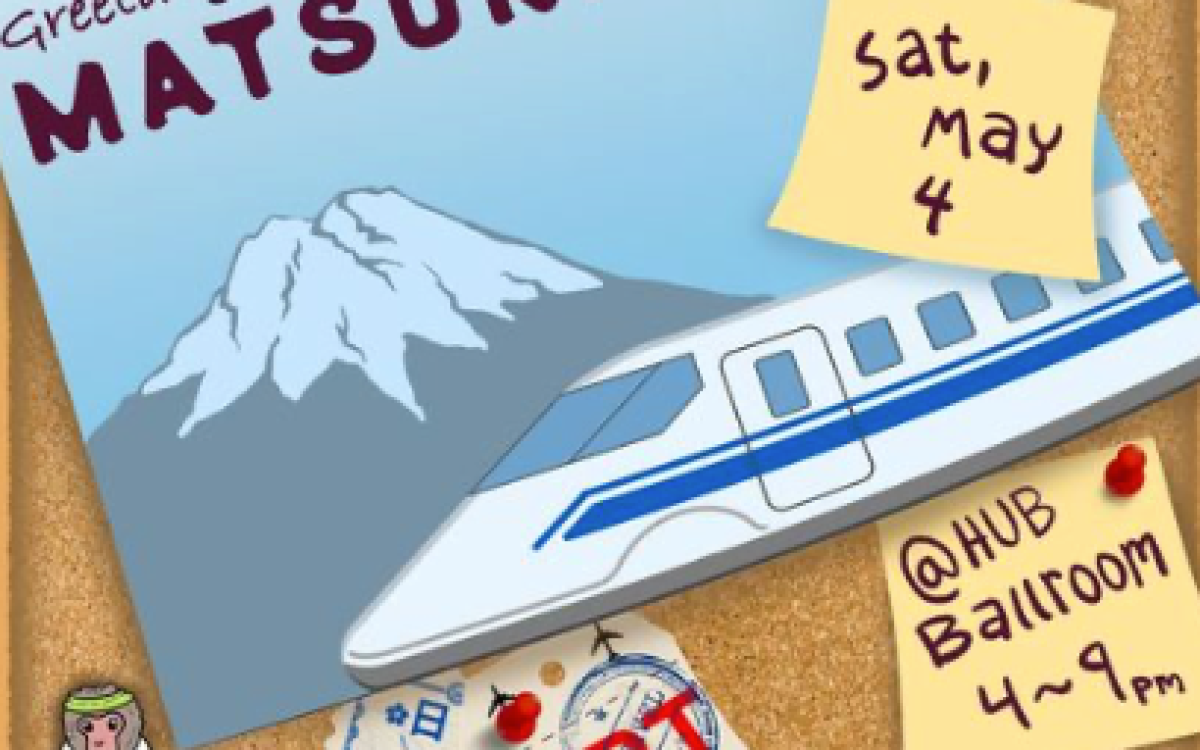At a glance
Matsuri is an event that the Japanese Student Association holds each year in the HUB Ballroom. It is our largest event of the… Read full summary
- Funding received
- 2023-2024
- Mini
- Awarded
- $2,000
- Funding partners
-
- Services and Activities Fee (SAF)
Matsuri is an event that the Japanese Student Association holds each year in the HUB Ballroom. It is our largest event of the year and is open to both UW students and the public. This year's theme is "Going Around Japan" and will include foods, games, prizes, and performances from the many prefectures of Japan. The foods will include gyoza, udon, curry, kakigori, dorayaki, and dango. Some of the games include daruma, gacha sukui, and pankyui kyousou.
Matsuri is an event that the Japanese Student Association holds each year in the HUB Ballroom. It is our largest event of the year and is open to both UW students and the public. This year's theme is "Going Around Japan" and will include foods, games, prizes, and performances from the many prefectures of Japan. The foods will include gyoza, udon, curry, kakigori, dorayaki, and dango. Some of the games include daruma, gacha sukui, and pankyui kyousou. We will also have a variety of UW associated clubs performing and a traditional Japanese performance group called "Kabuki" coming from the Portland area. If accepted, we plan to use the funding provided by CSF to compensate the "Kabuki" performers.
We feel that this performance contributes directly to sustainability at UW for both social and environmental reasons. Socially, this is a "classical form of Japanese theatre" that guests will likely never see again unless they directly seek it out. It will provide an educational aspect of Japanese culture that is hard to find elsewhere. Environmentally, we had the option to fly out a famous piano performer from Japan but opted for "Kabuki" for sustainability reasons. Hiring a local performer greatly reduces the carbon emissions and lowers energy consumption from travel and played a large part in our decision.
We began planning the event at the beginning of last quarter and are in the midst of creation and completion. We nearly the entire event planned so we are nearing the finishing stages of the project.
Jake Sasaki
Project lead
- jsasaki@uw.edu
- Affiliation
- Student
- Years
- 2 year(s) remaining at UW
- Affiliated groups
- Japanese Student Association
Cass Nguyen
Team member
- eccadvs@uw.edu
- Affiliation
- Staff
- Affiliated groups
- Samuel E. Kelly Ethnic Cultural Center
Request amount and budget
Plans for financial longevity
Our project is an annual event, so it will repeat itself the next year with minor changes to theme, foods, games, etc.
Our project is an annual event, so it will repeat itself the next year with minor changes to theme, foods, games, etc. Attached is a list of our performance timeline. Felt it was most appropriate given the funding will go towards performance.
Plans for long-term project management
n/a
Problem statement
While Matsuri relates to both "Leadership & Student Involvement" and "Education, Outreach, & Behavior Change", the event's main sustainability impact is through social sustainability. On a campus that has a vast amount of races, religions, and cultures, it is easy for smaller, underrepresented communities to be forgotten. Particularly, Asian cultures tend to be grouped together and form a fusion in some of the public's minds.
Our goal as the Japanese Student Association is to preserve and spread Japanese culture on the UW campus and its surrounding areas. With Matsuri being our largest event of the year, as well as being open to the public, we feel that this is our best opportunity to do so. By providing traditional Japanese games, foods, and performances, we hope to cultivate awareness and knowledge of our beloved culture.
Problem context
We are aligning with the University's Sustainability Action Plan through policies I, V, and VI. For policy I, we are actively engaging students and staff through RSO activities, volunteer opportunities, and hiring of staff/faculty for kitchen and technical setup. For policy V, we are lowering emissions from professional travel by at least 5% by opting to hire a local performer instead of flying out a performer from Japan. The drive from Portland to Seattle emits approximately 135.95 pounds of CO2 per one-way trip compared to 1 ton of CO2 per economy class seat in a one-way trip from Japan to Seattle. For policy VI, we are using at least 35% of food from local sources as 18 out of our 38 ingredients used are being directly ordered from the HUB. We are also related to goal 5 of the Diversity Blueprint as our event explores and engages with the racial/ethnic histories of Japan and its communities on the UW campus.
Measure the impacts
| Impact / goal | Metric(s) of success | UW stakeholders impacted |
|---|---|---|
| Engaging UW community | 650 UW students/faculty/staff engaged | Undergraduate, Graduate, Academic staff, Admin staff |
Communication tactics and tools
We have a PR team working on all promotional materials. The team hand draws all of our flyers, posters, and social media posts. They will begin rolling out these materials in the next week or so. We also table in the Red Square where we promote the event. Last year, we had the event published in a local newspaper but we are unsure if this will be repeated this year.
Outreach communication plan
Our main method of communication to share our project and its impacts will be through social media. We have a very active instagram account that announces and gives recaps of events. Our project will benefit all groups, organizations, or communities that attend our event. It will provide a fun, culturally enriching environment for all.
Student involvement
We do provide a volunteer opportunity for people looking to help out with the event. This includes helping prepare/hand out food or work the game booths.
